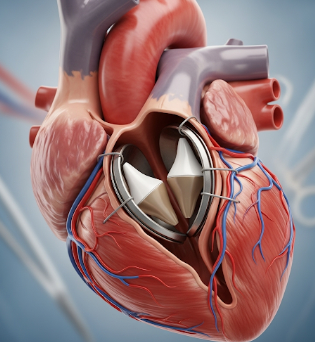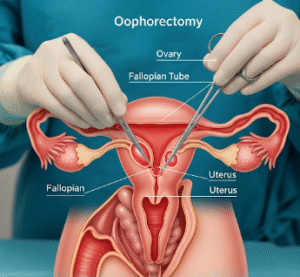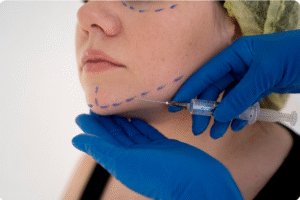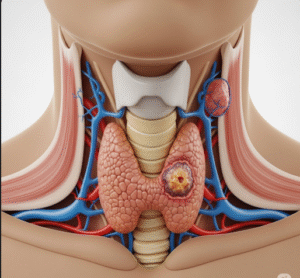What it is
Mitral valve replacement is a surgical procedure to replace a damaged or diseased mitral valve in the heart. The mitral valve regulates blood flow between the left atrium and left ventricle, ensuring efficient circulation.
Key points:
- Can involve mechanical or biological (tissue) valves.
- Performed when the mitral valve is severely narrowed (stenosis) or leaking (regurgitation).
- Aims to restore normal blood flow, reduce symptoms, and prevent heart failure.
- Often part of cardiothoracic surgical programs in specialized hospitals.
Why it’s done
Mitral valve replacement is indicated for:
- Mitral valve stenosis: Narrowing that impedes blood flow.
- Mitral valve regurgitation: Leakage causing backward blood flow.
- Severe symptoms: Shortness of breath, fatigue, palpitations, or heart failure.
- Failed valve repair: When repair is not feasible or effective.
- Prevention of complications: Reduces the risk of stroke, atrial fibrillation, or pulmonary hypertension.
Note: Surgery is recommended when medical management is insufficient or the valve disease is severe.
Alternatives
Other treatment options may include:
- Medication management: To control heart rate, blood pressure, or heart failure symptoms.
- Balloon valvotomy: A minimally invasive procedure to open narrowed valves in selected patients.
- Valve repair: Surgical repair of the mitral valve instead of replacement.
- Lifestyle management: Diet, exercise, and monitoring may help but cannot correct severe valve dysfunction.
Important: Replacement is usually required when valve function is severely compromised or symptoms are significant.
Preparation
Preparation for mitral valve replacement is crucial:
- Medical evaluation: Blood tests, ECG, echocardiography, and coronary angiography.
- Medication review: Stop certain drugs, including blood thinners, under physician guidance.
- Anesthesia assessment: Full evaluation for general anesthesia safety.
- Preoperative instructions: Fasting, showering, and following hospital protocols.
- Psychological preparation: Counseling may help reduce anxiety and improve post-surgery recovery.
Patient instructions:
- Arrange postoperative support at home.
- Follow all pre-surgery instructions regarding medication and fasting.
- Discuss reconstruction or prosthetic valve choices with the surgeon.
How it’s done
Mitral valve replacement is performed under general anesthesia in a cardiac surgery operating room:
- Incision: Surgeon makes a sternotomy (chest incision) or minimally invasive incision.
- Heart-lung bypass: Patient is connected to a heart-lung machine to maintain circulation during surgery.
- Valve removal: The diseased mitral valve is excised.
- Valve replacement: Mechanical or biological valve is implanted.
- Closure: Heart-lung bypass is discontinued, heart function restored, and incision closed.
- Monitoring: Patient is transferred to ICU for intensive monitoring.
Duration: Surgery typically lasts 3–6 hours, depending on complexity and patient factors.
Recovery
Recovery from mitral valve replacement involves:
- ICU stay: Usually 1–2 days for close monitoring.
- Hospital stay: Approximately 5–10 days, longer if complications arise.
- Pain management: Medications to control surgical discomfort.
- Activity: Gradual increase in activity; physical therapy may be recommended.
- Long-term care: Lifelong follow-up, especially for mechanical valves requiring anticoagulation.
- Lifestyle adjustments: Heart-healthy diet, regular exercise, and monitoring for infection or valve complications.
Benefits:
- Restores normal blood flow and heart function.
- Reduces symptoms such as shortness of breath and fatigue.
- Prevents serious complications like stroke, heart failure, or arrhythmias.
- Improves quality of life and long-term survival.
Complications / Risks
Mitral valve replacement carries potential risks:
- Bleeding or infection at the surgical site.
- Stroke or blood clots, especially with mechanical valves.
- Arrhythmias: Irregular heart rhythms post-surgery.
- Valve malfunction or deterioration over time.
- Reaction to anesthesia or medications.
- Other cardiac complications: Rare but possible in complex cases.
Prevention / Management:
- Performed by experienced cardiac surgeons in specialized centers.
- Postoperative anticoagulation and monitoring reduce clotting and stroke risk.
- Regular follow-up echocardiography ensures valve function and early detection of issues.
Treatment Options in Korea
Mitral valve replacement is widely available in Korean hospitals, cardiology, and cardiothoracic surgery centers:
Key features:
- Performed by highly experienced cardiac surgeons using advanced surgical techniques.
- Options include mechanical and tissue valve replacement, tailored to patient needs.
- Postoperative care includes ICU monitoring, rehabilitation, and long-term follow-up.
- Hospitals provide comprehensive cardiac care, including pre-surgery evaluation, surgical treatment, and recovery support.
- Patients benefit from state-of-the-art surgical facilities, skilled staff, and evidence-based postoperative care.
Summary: Mitral valve replacement in Korea is a safe, effective, and life-saving procedure for patients with severe mitral valve disease. With modern surgical techniques, expert care, and comprehensive rehabilitation, patients experience improved heart function, reduced symptoms, and enhanced quality of life.













